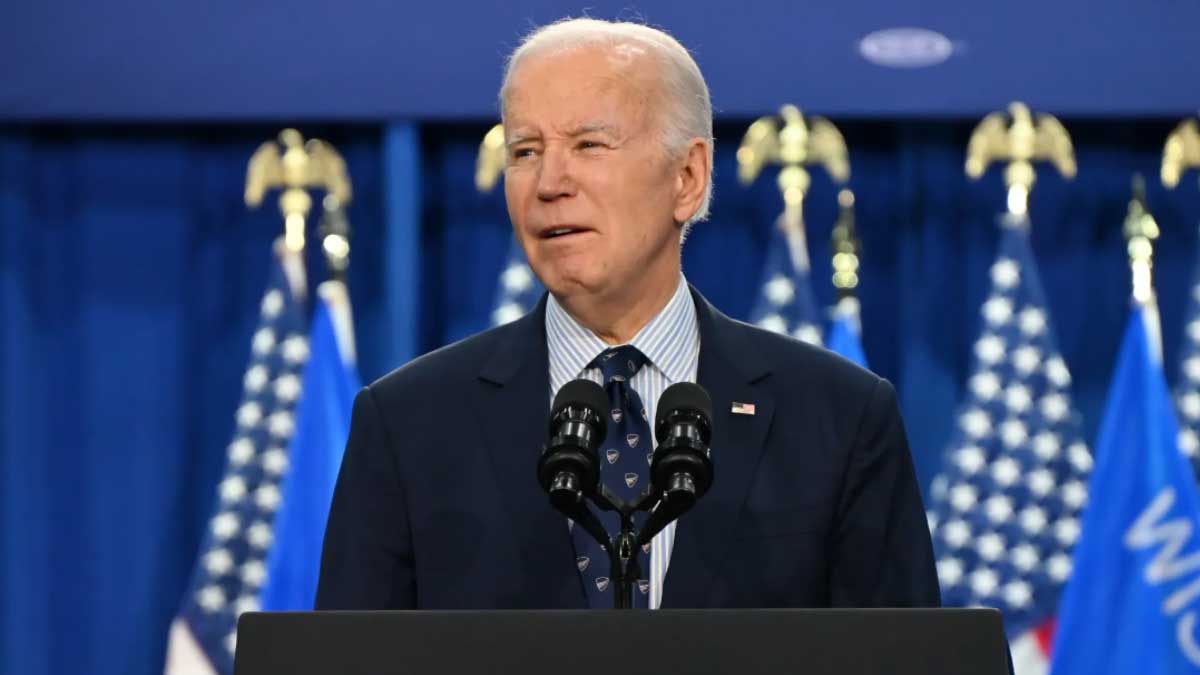- Home
- Billionaires
- Investing Newsletters
- 193CC 1000
- Article Layout 2
- Article Layout 3
- Article Layout 4
- Article Layout 5
- Article Layout 6
- Article Layout 7
- Article Layout 8
- Article Layout 9
- Article Layout 10
- Article Layout 11
- Article Layout 12
- Article Layout 13
- Article Layout 14
- Article Sidebar
- Post Format
- pages
- Archive Layouts
- Post Gallery
- Post Video Background
- Post Review
- Sponsored Post
- Leadership
- Business
- Money
- Small Business
- Innovation
- Shop
Recent Posts
Supreme Court Blocks Biden’s Student Loan Forgiveness Plan

The U.S. Supreme Court has decided to keep the Biden administration’s latest student loan forgiveness initiative, known as the Saving on a Valuable Education (SAVE) plan, on hold while legal challenges against it proceed. This decision comes as a result of lawsuits filed by Republican-led states, and it effectively pauses the potential benefits of the plan for many borrowers while the court battle unfolds.
The SAVE plan is an income-driven repayment strategy designed to reduce the percentage of monthly income that borrowers are required to pay on their student loans. It also accelerates the timeline for loan forgiveness and broadens the eligibility for borrowers to make $0 payments each month. However, the plan has faced legal opposition, leading to two significant lawsuits.
The first lawsuit, filed in Kansas by multiple states and referred to as Alaska v. Department of Education, challenges the legality of the SAVE plan. Initially, a district court blocked parts of the plan from being implemented, but the 10th Circuit Court of Appeals later overturned that decision, allowing the plan to proceed while the legal battle continues. In response, Republican-led states escalated the case to the Supreme Court, seeking to pause parts of the program while the litigation plays out.
The second lawsuit, known as Missouri v. Department of Education, resulted in a district court pausing one aspect of the SAVE plan. The 8th Circuit Court of Appeals, however, took a more sweeping approach and blocked the entire program in August, ruling that the government cannot proceed with any relief under the SAVE plan until further notice. The Supreme Court’s ruling on Wednesday supports the 8th Circuit’s decision, ensuring that the program remains blocked entirely until the 8th Circuit issues its final verdict on the legality of the plan.
The Supreme Court’s decision comes with a clear directive: the 8th Circuit should render its decision swiftly. Notably, no justice publicly dissented from the decision to keep the SAVE plan on hold, and the court also dismissed a request in the Alaska case, citing the 8th Circuit’s existing block as sufficient.
For borrowers, the implications of this ruling are significant. The Department of Education had announced earlier in August that borrowers enrolled in the SAVE plan would have their loans placed in forbearance, meaning they would not have to make payments while the court case is ongoing. This forbearance will continue indefinitely as the 8th Circuit deliberates on whether the program should be overturned. During this period, borrowers will not accrue interest on their loans, though the time spent in forbearance will not count towards loan forgiveness under income-driven repayment plans or for public service loan forgiveness. Borrowers who have received bills for August payments will have their loans placed in forbearance, negating the need to pay, and those who have not yet received bills will not be issued one. The Education Department has committed to providing regular updates to borrowers as the legal situation evolves.
The SAVE plan was introduced by the Biden administration in August 2023 as a replacement for the previous Revised Pay-As-You-Earn (REPAYE) plan. The new plan offers more favorable terms for borrowers, including cutting the time for loan forgiveness from 20 or 25 years down to 10 years for those owing $12,000 or less. It also reduces the payment requirement for undergraduate loans from 10% to 5% of a borrower’s monthly income and raises the income threshold for qualifying for $0 monthly payments from 150% to 225% of the poverty line. The administration justified these changes under federal rules governing income-driven repayment plans, which mandate that payments vary according to a borrower’s income as determined by the Education Secretary.
Despite these provisions, there are still many unknowns about the scope of the 8th Circuit’s ruling and its impact on student loan forgiveness. The ruling not only blocks the SAVE plan but also broadly prohibits the government from offering any additional forgiveness of principal or interest on loans covered by income-driven repayment plans or the Federal Family Education Loan (FFEL) program. The Biden administration has sought clarification on this aspect, concerned that it could affect other student loan programs not directly involved in the lawsuit. However, the 8th Circuit has declined to provide clarification, leaving open the possibility that other student loan forgiveness initiatives could also be affected.
The 8th Circuit’s decision has faced sharp criticism, particularly from Education Secretary Miguel Cardona, who argued that the ruling undermines a longstanding practice of providing loan forgiveness. He condemned the lawsuits as politically motivated efforts by Republican officials to block relief for millions of borrowers.
The SAVE plan has already enrolled more than 8 million borrowers, according to the Biden administration. The uncertainty surrounding the plan is likely to have broader implications, potentially affecting other borrowers with income-driven repayment plans. This uncertainty has also led to increased confusion among borrowers, which in turn has strained the systems of student loan servicers.
In addition to the SAVE plan, the Biden administration has introduced another student loan forgiveness initiative targeting borrowers who now owe more than they originally borrowed, have been paying on undergraduate loans for over 20 years, or are eligible for forgiveness under existing programs but have not applied. However, this plan is still in the process of being finalized, and its fate remains uncertain, particularly in light of the ongoing legal challenges to the SAVE plan.
The Biden administration’s focus on student loan forgiveness comes in response to strong calls for debt relief from progressive groups, though the president’s efforts have been met with significant legal resistance. Initially, Biden proposed a broader plan to forgive up to $20,000 in loans for federal borrowers earning up to $125,000 annually. This plan was struck down by the Supreme Court in June 2023, which ruled that the administration had overstepped its authority. Since then, the administration has pursued more targeted approaches to loan forgiveness, with the Education Department reporting over $168 million in relief provided as of July.
The legal battles over student loan forgiveness are likely far from over, with the possibility of further Supreme Court involvement as the cases progress. For now, borrowers enrolled in the SAVE plan and other income-driven repayment plans remain in a state of uncertainty, awaiting the final outcome of these legal challenges.
Recent Posts
Categories
- 193 Countries Consortium Partner1
- 193cc Digital Assets2
- 5G1
- Aerospace & Defense48
- AI37
- Arts3
- Banking & Insurance11
- Big Data3
- Billionaires1,261
- Boats & Planes1
- Business332
- Careers13
- Cars & Bikes79
- CEO Network1
- CFO Network17
- CHRO Network1
- CIO Network1
- Cloud10
- CMO Network18
- Commercial Real Estate7
- Consultant1
- Consumer Tech194
- CxO1
- Cybersecurity73
- Dining1
- Diversity, Equity & Inclusion4
- Education7
- Energy8
- Enterprise Tech29
- Events11
- Fintech1
- Food & Drink2
- Franchises1
- Freelance1
- Future Of Work2
- Games149
- GIG1
- Healthcare79
- Hollywood & Entertainment203
- Houses1
- India’s 1000 Richest1
- Innovation46
- Investing2
- Investing Newsletters4
- Leadership65
- Lifestyle11
- Manufacturing1
- Markets20
- Media327
- Mobile phone1
- Money13
- Personal Finance2
- Policy569
- Real Estate1
- Research6
- Retail1
- Retirement1
- Small Business1
- SportsMoney42
- Style & Beauty1
- Success Income1
- Taxes2
- Travel10
- Uncategorized13
- Vices1
- Watches & Jewelry2
- world's billionaires1,230
- Worlds Richest Self-Made Women2
Related Articles
South Korea Plane Crash: A Tragic Loss and Global Mourning
The tragic plane crash at South Korea’s Muan International Airport on Sunday...
By 193cc Agency CouncilDecember 30, 2024H-1B Visa Debate Splits Trump Allies and Silicon Valley
The debate over H-1B visas has once again become a contentious issue,...
By 193cc Agency CouncilDecember 28, 2024Trump Moves $4B Stake in Truth Social Parent, Stock Drops 6%
Donald Trump recently transferred his 57% stake in Trump Media & Technology...
By 193cc Agency CouncilDecember 20, 2024House Rejects Trump-Backed Funding Bill, Shutdown Looms
The U.S. House of Representatives rejected a new government funding bill on...
By 193cc Agency CouncilDecember 20, 2024















Leave a comment